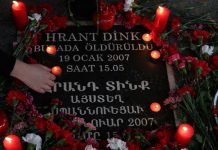Turkey’s Armenian community still fears for its safety despite a ceasefire in Nagorno-Karabakh, after ultranationalist elements, with tacit approval of the Turkish government, used the clashes between Azerbaijan and Armenia to fuel a new wave of anti-Armenian sentiment.
In a report for Turkish Minute, Yerevan-based Turkish-Armenian journalist Alin Ozinian said many Armenians still believe the latest protests were attempts to frustrate the community and were provocative acts aimed at repressing the Armenians and giving them a hard time.
Since the beginning of the clashes on September. 27, the state-run and pro-government press, as well as the public, were focused on the military actions in the war. In early October Turkish President Recep Tayyip Erdoğan praised Azerbaijan’s “great operation both to defend its own territories and to liberate the occupied Karabakh.”
İbrahim Karagül, editor-in-chief of the pro-Erdoğan Yeni Şafak daily, was one of the most prominent journalists promoting hate speech towards Armenians on Turkish social media. “A missile must accidentally fall right in the center of Yerevan,” he tweeted on Sept. 27. His tweet generated 11,000 retweets.
Turkey’s “full support,” mentioned several times by Erdoğan, also fed into the ultranationalist feelings of Turkish society. “Turkey stands with and will continue to stand with friendly and brotherly Azerbaijan with all our means and all our heart,” Erdoğan said.
A group of Turks and Azeris were allowed to stage protests in front of the Armenian Patriarchate in Istanbul on September 27, following the outbreak of conflict between Armenia and Azerbaijan. Protesters waved Azerbaijani and Turkish flags and chanted slogans in a convoy of cars on the patriarchate’s street in Istanbul’s Kumkapı neighborhood.
Describing the move as a provocation by the Turkish government, Garo Paylan, an Armenian-Turkish deputy from the pro-Kurdish Peoples’ Democratic Party (HDP), warned authorities, saying: “I call on the government to take the necessary measures for our patriarchate and [Armenian] institutions. The result of hate speech is hate crime. Put an end to the politics of hate!”
Ermeni Patrikhanesi’nin olduğu sokakta böyle bir gösteri yapılmasına izin verilmesi provakasyondur.
İktidarı, Patrikhanemiz ve kurumlarımızla ilgili gerekli tedbirleri almaya çağırıyorum.
Nefret söylemlerinin sonu nefret suçlarıdır.
Nefret siyasetine son verin! pic.twitter.com/ggGLf6SIqX— Garo Paylan – Կարօ Փայլան (@GaroPaylan) September 28, 2020
Ömer Faruk Gergerlioğlu, an HDP deputy and human rights activist, also questioned the approval for the demonstration granted by Turkish authorities, asking whether the Justice and Development Party (AKP) government was planning for “new September 6-7 incidents.“ The lawmaker was referring to the 1955 İstanbul pogrom against minorities, including Greeks, Armenians and Jews.
Aras, 43, a mechanical engineer who works for a well-known foreign company, told Turkish Minute that he was exhausted because of the oppressive atmosphere in his workplace. “My colleagues were continuously asking me questions regarding Armenians’ position on the Karabakh problem and telling me that ‘Armenia has bitten off more than it can chew.’ I explained many times that I am not a representative of Armenia, and more importantly that I’m a citizen of Turkey. My words didn’t change anything. Sometimes I feel like I’m being suffocated and that there is no longer room for Armenians in this country.”
Turkish Minute spoke with Yetvart Danzikyan, editor-in-chief of the Agos weekly newspaper, published in both Turkish and Armenian. He said the nationalist atmosphere had alarmed the Armenian community and that the government took additional security measures for Armenian institutions, including churches, schools and newspapers, in view of the current situation.
“A sub-commission of parliament’s Human Rights Inquiry Committee visited the Armenian Patriarchate and other Armenian institutions as well as the Agos newspaper. We tried to explain the community’s distress because of the media’s anti-Armenian attitude and the proliferation of hate speech. We reminded them that the ‘Armenia started the war’ statement by officials and the press does not reflect the reality and is a misrepresentation of the facts,” Danzikyan added.
Ozinian says, “The Turkish press continues to spread aggressive rhetoric full of hatred against Armenians, while Erdoğan and his ‘teammates’ are fueling Turkey’s totalitarian regime with nationalism and xenophobia.”
Paylan was targeted on October 2 in newspaper ads published by the nationalist Center for Eurasian Strategic Studies (ASAM) think tank for comments he made about the ongoing clashes between Azerbaijan and Armenia.
The ads claimed that Paylan “shamelessly blamed Azerbaijan and Turkey and openly backed Armenia.” Describing the lawmaker’s words as “evidence of treason,” ASAM called on the “independent judiciary” and the Turkish parliament to take “the necessary steps” about Paylan.
ASAM’s ad said the Turkish nation would “never forgive those who try to create false perceptions against the Turkish government by spreading the ‘It is claimed that Turkey is sending arms and jihadist militants to fight in Azerbaijan’ narrative.”
ASAM was founded by Ümit Özdağ, a deputy recently expelled from the nationalist Good (IYI) Party, who is known for his anti-Syrian campaign aiming to send Syrian refugees back home.
According to a hate-speech report by the Hrant Dink Foundation, titled “Hate Speech and Discriminatory Discourse in Media 2019 Report,” Armenians were the most targeted group in 2019 with 803 hate speech items. They have been portrayed as enemies and associated with violence, terrorism and massacres in the context of the Armenia-Azerbaijan conflict.
Several attacks have targeted the Armenian community in İstanbul this year. In May a man had attempted to set fire to the gate of the Dznunt Surp Asdvadzadzni Church in İstanbul’s Bakırköy district. Three weeks later, a crucifix from the gate of the Armenian Surp Krikor Lusaroviç Church in the Kuzguncuk district, on the Asian side of Istanbul, was ripped down. A threatening letter was also sent to the Hrant Dink Foundation, which was established in 2007 following the assassination of Hrant Dink, the founder of the Agos weekly.
In August some of the graves in the Armenian cemetery of either the Surp Pırgiç or Karasun Manug church foundation in the Sincan district of Ankara were desecrated.
One hundred forty-two Armenians left Turkey on October 28, amid rising anti-Armenian sentiment following the Azerbaijani-Armenian clashes, according to a tweet by Danzikyan.
Türkiye'de yaşayan Ermenistanlılar'dan 142 kişi bugün ülkesine döndü. Az insanın umurunda olacağını biliyorum. Kaybediyoruz. Hep beraber kaybediyoruz, kanıyoruz.
— yetvart danzikyan (@yozgatedirnetra) October 28, 2020
“142 of the Armenian nationals living in Turkey returned to their country today,” Danzikyan said in his tweet. “I know only a handful of people will care. We are losing. We are losing and bleeding all together.”















